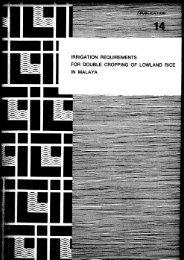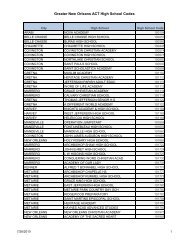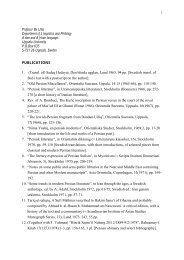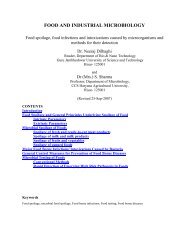On the Future of Indigenous Traditions - Munin
On the Future of Indigenous Traditions - Munin
On the Future of Indigenous Traditions - Munin
You also want an ePaper? Increase the reach of your titles
YUMPU automatically turns print PDFs into web optimized ePapers that Google loves.
CHAPTER THREE: Adivasi Politics<br />
3.1. Adivasi organisation as a political association<br />
In this chapter before looking into <strong>the</strong> Adivasis’ political association, it would be<br />
important to briefly look into <strong>the</strong> discourse <strong>of</strong> political thought <strong>of</strong> nation-state first.<br />
Thereafter, I shall take <strong>the</strong> insight given by Max Weber on <strong>the</strong> ‘tribes’ and <strong>the</strong> ‘caste’<br />
in India in his Essays in Sociology 79 which can be a basis for discussion. As a followup<br />
it will be to place <strong>the</strong> Adivasi political association in <strong>the</strong> discourse <strong>of</strong> political<br />
thought.<br />
In <strong>the</strong> political thought, according to Scruton, <strong>the</strong> state, in <strong>the</strong> modern use <strong>of</strong> its<br />
definition (Machiavelli) <strong>the</strong>re are two adherences, <strong>the</strong> rights <strong>the</strong>ory <strong>of</strong> politics and<br />
ano<strong>the</strong>r, power <strong>the</strong>ory. The first consider (Hegel) ‘<strong>the</strong> state is actuality <strong>of</strong> <strong>the</strong> ethical<br />
idea’, whereas, <strong>the</strong> second considers (Weber) that <strong>the</strong> state is organisation which<br />
‘monopolizes legitimate violence over a given territory’. Both views accept <strong>the</strong><br />
distinction between <strong>the</strong> state and society; however, law in it may be essential to <strong>the</strong><br />
first view and not essential to <strong>the</strong> second. The many obscurities are thus revealed if<br />
<strong>the</strong> definition <strong>of</strong> <strong>the</strong> state is broken down into components. (i) Association among<br />
persons for <strong>the</strong> end <strong>of</strong> government; (ii) legal organisation: i.e. <strong>the</strong> power <strong>of</strong> <strong>the</strong><br />
government is exercised partly through law, and hence may be determined and limited<br />
in certain cases by a constitution; (iii) attachment to a particular territory over which<br />
jurisdiction is exercised; (iv) personification: i.e. <strong>the</strong> state is both a juristic person and<br />
a kind <strong>of</strong> quasi-person in popular thinking, with rights, obligations and also a personal<br />
identity over time distinct from <strong>the</strong> identity <strong>of</strong> its members. Fur<strong>the</strong>rmore <strong>the</strong> state has<br />
agency and responsibility, whe<strong>the</strong>r or not in law. 80 Employing <strong>the</strong> said explanation for<br />
<strong>the</strong> state and within it analysing <strong>the</strong> Adivasis’ political association, will help us find<br />
where lies <strong>the</strong> problem for <strong>the</strong> Adivasi in <strong>the</strong> context <strong>of</strong> India. However, before going<br />
into it one could ask how to define <strong>the</strong> political association <strong>of</strong> <strong>the</strong> Adivasis. This is<br />
79<br />
H.H. Gerth and C.W. Mills, Max Weber: Essays in Sociology, (London: Routledge, [1948], 1991),<br />
398.<br />
80<br />
Roger Scruton, “State”, A Dictionary <strong>of</strong> Political Thought, London: Pan Book Ltd. with <strong>the</strong><br />
Macmillan Press 1982, 446-7.<br />
57

















